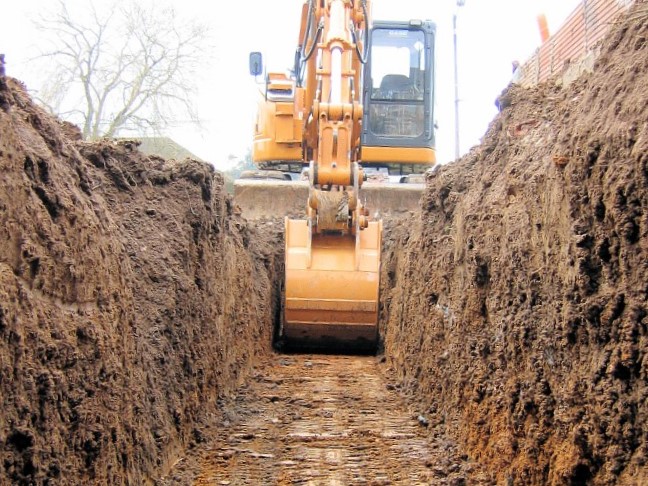Septic Ohio - Comprehensive Septic System Providers in Ohio
Septic Ohio - Comprehensive Septic System Providers in Ohio
Blog Article
Comprehensive Excavation Strategies: Mastering the Basics for Success
In the realm of building and construction and civil engineering, the relevance of effective excavation techniques can not be overstated. The careful planning, precise implementation, and meticulous interest to detail needed in excavation jobs demand a thorough method that incorporates various basic elements. From preliminary soil analysis to the application of security steps and normal development surveillance, understanding these core components is important for attaining success in any excavation venture. The real mastery exists not simply in comprehending these basics however in effortlessly integrating them to navigate the complexities of excavation projects with finesse.
Comprehending Excavation Project Planning

Effective excavation jobs are constructed on the foundation of comprehensive and meticulous planning. The initial stage of any excavation task is the drawing board, where important decisions are made that can significantly impact the end result of the task. During this phase, it is necessary to collect all pertinent information regarding the website, including topographical surveys, dirt structure, and any kind of potential dangers that might exist. Understanding the job timeline, spending plan, and extent restrictions is critical for producing a thorough excavation plan that ensures the project's success.
One secret aspect of excavation job planning is the development of a comprehensive timeline that details the sequence of deadlines, landmarks, and activities. This timeline acts as a roadmap for the job group, allowing them to track progression and make necessary adjustments to guarantee the project remains on routine. In addition, a distinct budget plan that accounts for all expenses, consisting of devices leasing, labor costs, and products, is vital for staying clear of cost overruns and hold-ups. By thoroughly considering all these factors during the drawing board, excavation jobs can be implemented efficiently and effectively, causing effective end results.
Soil Analysis and Website Examination
Performing thorough dirt analysis and site assessment is a critical action in the preparation phase of any kind of excavation job. Soil evaluation includes establishing the make-up, structure, and residential properties of the dirt at the excavation site. This info is vital for understanding the dirt's bearing capability, wetness web content, and capacity for disintegration, which are key consider determining the excavation techniques and devices required for the project.
Site analysis surpasses dirt analysis and encompasses a more comprehensive analysis of the general site problems. This examination includes determining any prospective risks, such as underground energies, ecological issues, or unpredictable terrain, that can affect the excavation procedure. By completely reviewing the site, project managers can establish effective excavation methods that focus on safety, efficiency, and environmental defense.
Making use of advanced innovations like ground-penetrating radar, soil sampling, and drone surveys can improve the accuracy and effectiveness of soil analysis and website examination. Spending time and resources in these initial steps can eventually conserve time and prevent expensive hold-ups or issues throughout the excavation procedure.
Devices Option and Utilization
Efficient excavation projects count heavily on tactical tools option and application to make certain optimal efficiency click here to find out more and productivity. Picking the best tools for the work is critical in optimizing effectiveness and decreasing downtime. Elements such as the kind of dirt, depth of excavation, and task extent play a substantial duty in identifying one of the most appropriate tools for the job at hand.

In addition to selecting the proper tools, appropriate use is crucial to job success. Operators should be trained to manage the tools safely and successfully - lancaster excavation. Routine upkeep checks and timely fixings assist protect against break downs and guarantee consistent performance throughout the project
Safety And Security Steps and Laws Compliance
In the world of excavation jobs, prioritizing precaution and conformity with policies is paramount to guaranteeing a legitimately sound and safe operational setting. Precaution incorporate a series of methods, including carrying out comprehensive website analyses, applying proper signs and obstacles, and offering sufficient safety training for all personnel associated with the excavation procedure. Adherence to policies, such as OSHA needs in the United States, makes sure that the excavation task fulfills the required criteria to shield workers, onlookers, and the surrounding environment.

Monitoring Progress and Adjusting Strategies
How can forecast supervisors successfully track the improvement of excavation tasks and adjust their techniques accordingly to optimize end results? Tracking development is essential for guaranteeing that excavation projects remain on track and satisfy deadlines.

Final Thought
To conclude, grasping the fundamentals of thorough excavation techniques is essential for the success of any task. By recognizing project preparation, assessing dirt and website conditions, picking proper equipment, abiding by safety and security laws, and monitoring progress, project managers can guarantee a smooth and reliable excavation process. Executing these techniques directory will certainly result in effective results and lessen prospective risks or setbacks during the excavation project.
The preliminary visite site stage of any excavation task is the preparation phase, where important choices are made that can dramatically affect the outcome of the task. Recognizing the job extent, spending plan, and timeline restraints is critical for developing a comprehensive excavation plan that makes sure the job's success.
How can forecast managers properly track the improvement of excavation jobs and adapt their techniques accordingly to maximize end results? By closely monitoring progress and being eager to adjust strategies, job managers can boost the general success of excavation jobs.
By recognizing project planning, evaluating soil and site conditions, picking ideal equipment, conforming with security laws, and keeping an eye on progression, task managers can make sure a smooth and reliable excavation procedure.
Report this page